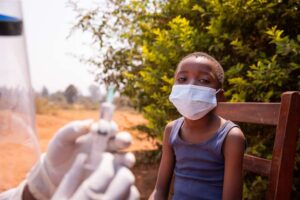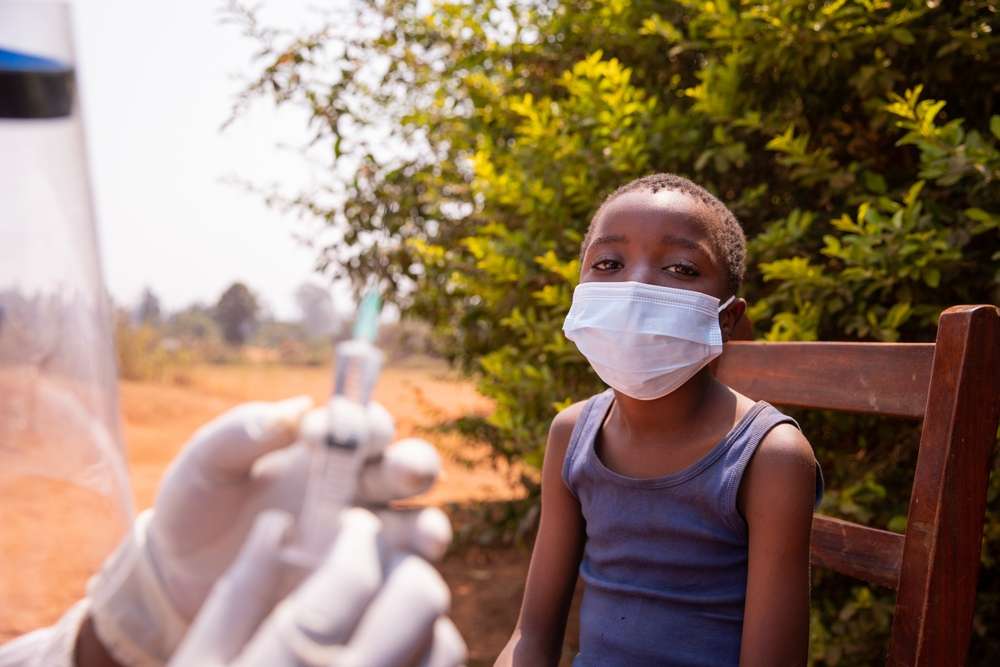Excitement in Africa as World Health Officials Introduce Groundbreaking Malaria Vaccines

The recent rollout of malaria vaccines in Africa, marking the world’s first routine immunization program against this mosquito-borne disease, has generated enthusiasm for a surprising and significant reason. The vaccine not only targets malaria but has shown a 13% reduction in all-cause mortality among children.
A Major Leap in Child Health
Dr. Mary Hamel, the World Health Organization’s senior technical officer on malaria, describes the RTS,S vaccine as a “huge step forward for malaria control” and emphasizes its major impact on child health. The breakthrough statistic of a 13% reduction in overall child mortality emerged from a successful WHO pilot campaign in Ghana, Kenya, and Malawi, where over two million children received the malaria vaccine since 2019.
Impressive Efficacy Against Malaria
Developed by GlaxoSmithKline, the RTS,S vaccine demonstrated promising results in Phase 3 trials, preventing approximately 39% of malaria cases and 32% of severe cases, as reported by WHO. Considering the immense global burden of malaria, even a 39% efficacy could translate into a substantial reduction in cases and deaths among children, as highlighted by Dr. Aaron Samuels, CDC’s Kenya malaria program director.
Challenges and Solutions: Vaccine Administration and Cost
Despite its potential, the RTS,S vaccine poses challenges. Children need four doses over a year, presenting logistical difficulties outside of clinical trial settings. Moreover, each dose comes with a cost of approximately $9.80. To address concerns about vaccine supply, WHO’s approval of a second malaria vaccine, R21/Matrix-M, requiring only three doses and costing $2-4 each, is expected to alleviate coverage shortages.
Scaling Up in Cameroon: Aiming to Save Lives
The RTS,S vaccine campaign has commenced in Cameroon, with the ambitious goal of reaching 6.6 million children across 20 African countries by 2025. Dr. Kate O’Brien, director of the Department of Immunization, Vaccines, and Biologicals at WHO, anticipates that scaling up the malaria vaccine will result in tens of thousands of lives saved annually.
Unexpected Bonus: Beyond Malaria Prevention
An unexpected and promising development is that the malaria vaccine appears to reduce deaths where malaria is a contributing factor, exacerbating other diseases but not directly causing the patient’s death. Dr. Steve Taylor, a global health and infectious disease expert at Duke, highlights the potential spillover benefits of the vaccine in reducing deaths related to diseases such as salmonella, which become more likely in individuals with malaria.
Transformative Impact on Education and Cognitive Development
Dr. Mohammed Abdulaziz, head of disease control and prevention at Africa CDC, emphasizes that beyond saving lives, the vaccine addresses malaria’s impact on education. Malaria, a significant reason for school absenteeism, anemia, and impaired cognitive development, becomes a crucial focus for improvement through the vaccine.
Welcome Development Amidst Rising Malaria Cases
As malaria cases have been steadily increasing in Africa, the vaccine’s introduction is timely. Dr. Chris Plowe, a malariologist at the University of Maryland, acknowledges the challenges posed by factors like climate change and drug resistance. The malaria vaccine, while not a standalone solution, is seen as a crucial component in the broader preventive program, complementing existing tools such as mosquito nets.
A Transformative Chapter in Public Health History
Experts caution against viewing the malaria vaccine as a “magic bullet” but stress its transformative potential when combined with existing preventive measures. The vaccine’s ability to work in tandem with bednets and malarial tablets offers a comprehensive approach, with a Lancet Infectious Diseases study indicating up to 90% prevention when combined.
In the words of Africa CDC’s Abdulaziz, the malaria vaccine marks a historic moment, bringing hope and tangible reductions in mortality and morbidity associated with malaria. The significance of this breakthrough extends beyond malaria control, influencing child health, education, and the broader landscape of public health in Africa.

The Long-Term Vision: A Comprehensive Approach to Global Health Challenges
Looking forward, the success of the malaria vaccine prompts a reevaluation of global health strategies. The unexpected bonus of reducing non-malaria deaths adds a layer of complexity to the vaccine’s impact, sparking discussions about its potential role in addressing other health challenges.
As we celebrate this milestone, it’s crucial to recognize the collaborative efforts of international organizations, pharmaceutical companies, and health professionals that made the malaria vaccine a reality. The challenges encountered, such as vaccine administration logistics and cost concerns, underscore the need for continued innovation and collaboration in the field of global health.
Beyond Malaria: A Catalyst for Future Research and Development
The success of the malaria vaccine serves as a catalyst for future research and development in the field of infectious diseases. The unexpected benefits observed raise intriguing questions about the interconnectedness of diseases and the potential for vaccines to have broader implications for public health.
Moreover, the approval of a second malaria vaccine, R21/Matrix-M, addresses concerns about vaccine supply and affordability. This opens avenues for exploring diverse approaches to vaccine development and deployment, ensuring a more comprehensive and accessible toolkit for combating infectious diseases.
Navigating Challenges: Climate Change, Drug Resistance, and Global Health Equity
While celebrating the achievements in malaria control, it’s essential to acknowledge the persistent challenges in the global health landscape. Climate change, contributing to the rise in malaria cases, emphasizes the need for adaptive strategies to combat vector-borne diseases.
Additionally, the growing threat of drug resistance underscores the importance of continuous surveillance and research to stay ahead of evolving pathogens. As we embrace the transformative potential of the malaria vaccine, addressing these challenges requires a concerted effort to promote global health equity and access to innovative solutions.
Conclusion: A Paradigm Shift in Global Health
The unveiling of the malaria vaccine’s surprising benefits marks a paradigm shift in global health. Beyond its role in malaria control, the vaccine emerges as a multifaceted tool with the potential to impact child health, education, and the broader landscape of infectious diseases.
As countries embark on large-scale vaccination campaigns, it’s crucial to maintain a holistic perspective, recognizing the interconnected nature of health challenges. The malaria vaccine sets a precedent for future innovations, encouraging a collaborative and interdisciplinary approach to address the complexities of global health in the 21st century.
In the ongoing pursuit of a healthier world, the lessons learned from the malaria vaccine journey serve as a beacon of hope and inspiration. The unexpected twists and turns highlight the dynamic nature of scientific progress, emphasizing the need for resilience, adaptability, and a shared commitment to building a more resilient and equitable global health ecosystem.
More Content:
- Breakthroughs in Alzheimer’s Research: A Comprehensive Overview – Micro2media
- The Impact of Technology on Physical and Mental Health – Micro2media
- WHO recommends R21/Matrix-M vaccine for malaria prevention in updated advice on immunization
- Millions more children to benefit from malaria vaccine as UNICEF secures supply
